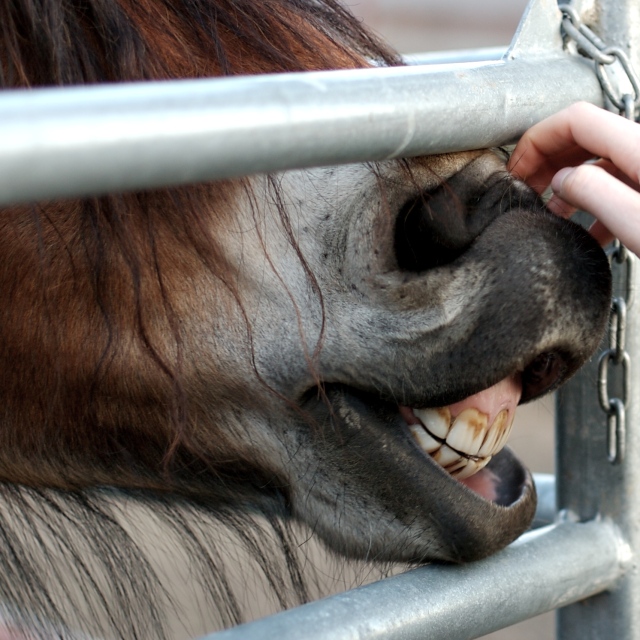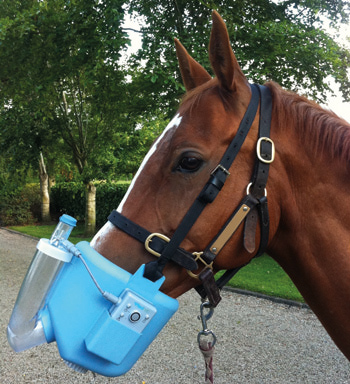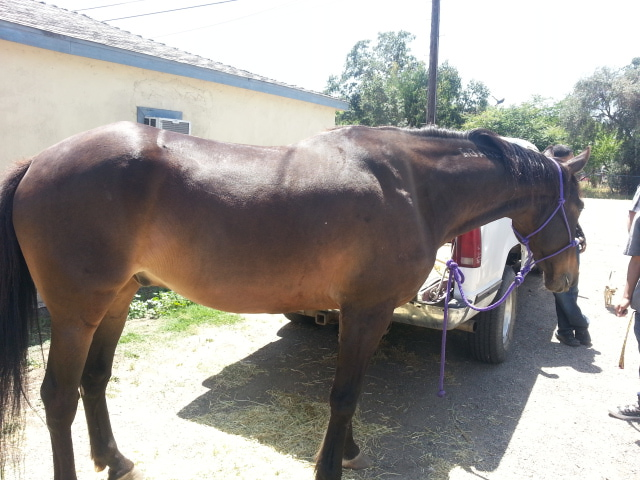QuestionHi
I have been told that adding vegetable oil to my horses diet will help with weigh gain. Which vegetable oil is best for horses?
Linseed, sunflower, saffron, olive, cootseed, maize or the Mitavite's Omega3, 6 & 9?
It is very confusing
Thanks
Jemma
AnswerJemma,
You might try looking for a high fat/high fiber feed first. It'll be easier to use than adding oil to the feed. There are a number of companies making them now - Purina, Nutrina, Pennfield. I'm sure there are others I don't know about. It all depends upon what's available in your area. Pennfield is a Mid-Atlantic feed company based in PA, the other 2 are national in the US. I'm sure that there are other brands as well.
If you wish to go the veg. oil route then use corn oil, it's palatable and generally cheaper than the others. Flax oil is wonderful but very expensive. About the most you can give the horse is 2 cups a day, 1 in the morning and 1 at night. More will give them diarrhea. The feed is much easier.
Secondly, why is your horse having a weight problem? I don't know what kind of work your horse does or it's living environment but I suspect you may have ulcers. They are finding, through research, that about 90% of performance horses - show, sport, endurance, racing - have ulcers although only about half actually exhibit the recognizable signs of ulcers. About 60% of backyard pleasure horses show up with ulcers.
It has to do with the conditions under which we keep and use the horses. The horse evolved over millions of years as a grazer, browsing and eating about 20 hrs. a day. The adult horse only sleeps about 45 min., real, true sleep. They do doze during other periods. As a result, their stomachs secret digestive acids continuously to deal with the continuous ingestion of food. Unless a horse is kept on pasture, good pasture, 24/7 they usually don't have access to food all the time. Then there's the time they are being ridden/driven when they are not eating at all. We've only domesticated horses for a couple of thousand years and that's not going to have changed the way the horse's digestive system works. So, we get lots of ulcers.
You can go the expensive route and get the horse scoped to check it out, and then you'll probably get something like Ulcer-Guard or Nutra-Buffer to give the horse. And that's for the rest of it's life. Or, treat the horse naturally with aloe vera juice and papaya pulp. You dump a half cup of aloe juice on the horse's feed which neutralizes not only stomach but intestinal acids. I give mine a 2 oz. syringe of papaya puree about 15-30 min. before I feed them. The papaya causes the digestive tissues to generate mucous which coats and protects the stomach tissues. I buy fresh papaya from a local produce wholesale market here, seed and pare it and puree it in the blender until it's the consistency of baby applesauce. 60 cc. catheter tipped syringes work great for administering it. It tastes good and the horses accept it readily. My gelding comes looking for it when he knows it's feeding time. I can buy gallon jugs of aloe vera juice at Wal-Mart for about $8. All natural, no side effects and definately cheaper than the Ulcer-Guard or Nutra-Buffer. I have been doing this now since I got Ahab, going on 3 yrs., but he's holding his weight nicely even when competing (he's a long distance trail horse) which he wasn't before. Plus I have him, along with my other endurance horses, on a high fat/high fiber feed. He gets more than the other horses, true, but at least I can keep the weight on him. He was losing it rapidly before despite throwing lots of feed at him before.
I hope this helps you out.
Lyn

 horse age
Question
horse age
hello, can you guess the horse age?
horse age
Question
horse age
hello, can you guess the horse age?
 behaviour
QuestionMy boy!
QUESTION: Hi Lyn, hope you can h
behaviour
QuestionMy boy!
QUESTION: Hi Lyn, hope you can h
 remedy for caugh and cold
Question
nebulizer
hello maam. what is the remed
remedy for caugh and cold
Question
nebulizer
hello maam. what is the remed
 leg bandages on fore legs
Question
leg bandages
hello maam. this is an ima
leg bandages on fore legs
Question
leg bandages
hello maam. this is an ima
 help identify my horse
Question
thunder
Hello I am asking for help I ha
help identify my horse
Question
thunder
Hello I am asking for help I ha